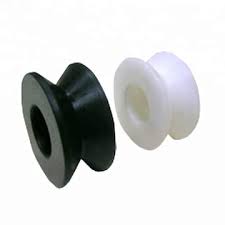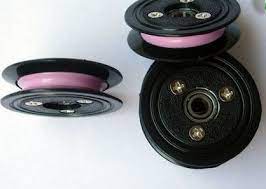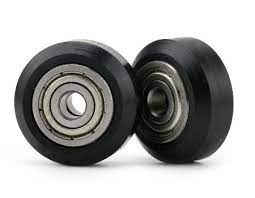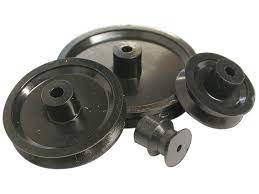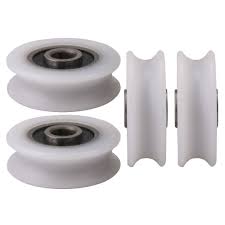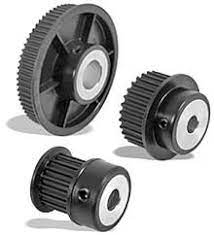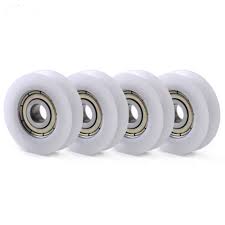Product Description
Machine Part Customized CNC Milling Parts Black Small Block Plastic Metal Double Groove Pulley Set Accessories Aluminum Pulley
Basic Information :
| Tolerance | 0.02~0.1mm. |
| Materials | Low, middle,high carbon steel / spring steel / Stainless steel 201, 301, 304, 316 / Aluminum / Brass / Bronze / Copper / Titanium / Plastic (PP, Nylon, PVC, APET) Brass or ABS,POM Ect And Customized raw material. |
| Surface Finish | Heat treatment / Polishing,Electronic Polishing / (Zinc, nickel, chrome, tin, brass, glod, silver, titanium) Plating / Electrophoresis / Black Oxide / Hot-dip galvanizing / Powder Coating / Paint Coating / Blasting / Shot Blasting / Bead Basting / Anodizing / Phosphating / PAD Printing / Laser etching / Dacromet Coating / Enamel. |
| Payment terms | Trade Assurance TT,paypal,Western Union,alipay,L/C. |
| Packing Detail |
Inner Packing: PE bag / EPE Foam Packing / Anti-Rust Paper Packing / Blister / SMT / Vacuum Packing / Plastic Box Packing / Color Box Packing. Outter Packing: Stretch Film Packing / Carton / Pallet / Wood Case. |
Our Advantage
-
Provide OEM/ODM service and assembling service, since 2000.
- One-stop purchasing service :Stamping part, CNC lathe part, CNC milling part, Springs, Shafts, fastener etc.
- The 2ndtier supplier of , factory audits passed.
- Product certification: RoHS, HE, vailable.
- Management certification: ISO/9001: 2015 and IATF16949 Passed.
/* January 22, 2571 19:08:37 */!function(){function s(e,r){var a,o={};try{e&&e.split(“,”).forEach(function(e,t){e&&(a=e.match(/(.*?):(.*)$/))&&1
| After-sales Service: | Custom Service |
|---|---|
| Warranty: | Custom Service |
| Condition: | New |
| Certification: | ISO9001 |
| Customized: | Customized |
| Material: | Stainless Steel |
| Samples: |
US$ 50/Piece
1 Piece(Min.Order) | |
|---|
| Customization: |
Available
| Customized Request |
|---|
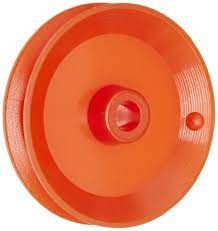
Can plastic pulleys withstand exposure to environmental conditions?
Plastic pulleys are designed to withstand exposure to various environmental conditions. Here’s a detailed explanation:
1. Moisture and Humidity:
Plastic pulleys are typically made from materials that are resistant to moisture and humidity. They have inherent properties that prevent water absorption, reducing the risk of swelling, warping, or degradation. This makes plastic pulleys suitable for use in environments with high humidity or where occasional exposure to moisture is expected, such as garages or outdoor applications.
2. Temperature Extremes:
Plastic pulleys exhibit different levels of temperature resistance depending on the specific material used. Many plastic pulleys are designed to withstand a wide range of temperatures, including both high and low extremes. For example, some pulleys made from engineering-grade plastics can operate reliably in temperatures ranging from -40°C to 100°C (-40°F to 212°F). However, it’s important to check the manufacturer’s specifications for temperature limits and choose pulleys that are suitable for the specific environment in which they will be used.
3. UV Exposure:
Extended exposure to ultraviolet (UV) radiation from the sun can potentially degrade certain types of plastics. However, many plastic pulleys are manufactured with UV stabilizers or additives that provide resistance to UV radiation. These additives help protect the plastic material from UV-induced degradation, such as discoloration, brittleness, or loss of mechanical properties. Plastic pulleys with UV resistance are commonly used in outdoor applications where they are exposed to direct sunlight.
4. Chemical Resistance:
The chemical resistance of plastic pulleys varies depending on the specific material used. Some plastics, such as polypropylene (PP) or polyethylene (PE), have excellent chemical resistance and can withstand exposure to a wide range of chemicals, including solvents, acids, and alkalis. However, other plastics may be more susceptible to chemical attack. It’s important to consider the specific chemicals present in the environment and select plastic pulleys that are compatible and resistant to those substances.
5. Dust and Dirt:
Plastic pulleys are generally resistant to dust and dirt accumulation. Their smooth surfaces and low-friction properties make it difficult for particles to adhere to the pulley’s surface. This reduces the risk of debris interfering with the pulley’s movement or causing excessive wear. However, periodic cleaning may still be necessary to ensure optimal performance and prevent any buildup of contaminants that could affect the pulley’s operation.
6. Impact and Vibration:
Plastic pulleys are designed to withstand the impact and vibration commonly encountered in various applications. The plastic materials used in their construction offer good impact resistance, absorbing and dispersing energy to prevent damage or failure. Additionally, plastic pulleys can dampen vibrations, reducing the strain on the pulley and other components of the system. However, it’s important to choose pulleys with the appropriate material properties and consider the specific impact and vibration levels of the application.
7. Saltwater and Corrosive Environments:
In environments where saltwater or corrosive substances are present, it’s crucial to select plastic pulleys that are specifically designed for such conditions. Certain plastics, such as acetal (POM) or polyvinyl chloride (PVC), offer good resistance to saltwater and corrosion. These materials are commonly used in marine or coastal applications where the pulleys may be exposed to saltwater spray or corrosive atmospheres.
While plastic pulleys are generally designed to withstand exposure to environmental conditions, it’s important to consider the specific requirements of the application and choose pulleys that are suitable for the intended environment. Manufacturers often provide guidance on the recommended materials and specifications for plastic pulleys based on their environmental resistance properties.
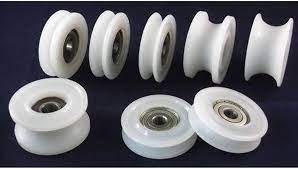
What safety considerations should be kept in mind when using plastic pulleys?
When using plastic pulleys, several safety considerations should be kept in mind to ensure the well-being of operators and the proper functioning of machinery or equipment. Here’s a detailed explanation:
1. Load Capacity:
One important safety consideration is to ensure that the plastic pulleys are selected and designed to handle the anticipated loads and forces in the application. Exceeding the load capacity of the pulleys can lead to premature failure, belt or chain slippage, or even catastrophic accidents. It is essential to consult the manufacturer’s specifications and guidelines to determine the maximum load capacity of the plastic pulleys and ensure they are not overloaded.
2. Material Compatibility:
Consider the compatibility of the plastic pulley material with the surrounding environment and the materials it comes into contact with. Some chemicals, solvents, or extreme temperatures may adversely affect certain types of plastic. Ensure that the chosen plastic material is resistant to the specific chemicals or conditions present in the application to avoid material degradation, weakening, or failure of the pulleys.
3. Proper Installation:
Correct installation of plastic pulleys is crucial for safety. Follow the manufacturer’s instructions and guidelines for proper pulley installation, including mounting options, alignment, and fastening mechanisms. Improperly installed pulleys can lead to misalignment, belt or chain disengagement, excessive vibrations, or other operational issues that compromise safety. Ensure that pulleys are securely attached and aligned to prevent accidents or damage to the machinery or equipment.
4. Guarding and Enclosures:
Consider incorporating appropriate guarding and enclosures around the plastic pulleys to prevent accidental contact with moving parts. This is especially important in conveyor systems or machinery where operators or maintenance personnel may need to interact with the pulleys. Guards and enclosures help prevent injury caused by entanglement, pinching, or getting caught in the rotating components, enhancing overall safety in the work environment.
5. Regular Inspection and Maintenance:
Regular inspection and maintenance of plastic pulleys are essential for identifying any signs of wear, damage, or degradation. Inspect the pulleys periodically to check for cracks, excessive wear, or any other visible issues. Replace any damaged or worn-out pulleys promptly to avoid unexpected failures or accidents. Additionally, follow the manufacturer’s recommendations for lubrication, cleaning, or any other maintenance procedures to ensure the pulleys function optimally and safely.
6. Training and Awareness:
Proper training and awareness among operators and maintenance personnel are essential for safe operation and handling of machinery or equipment with plastic pulleys. Ensure that personnel are trained on the correct procedures for operating, maintaining, and troubleshooting the equipment. They should be aware of the potential hazards associated with plastic pulleys and understand the safety protocols to follow, including lockout/tagout procedures, emergency stop mechanisms, and personal protective equipment requirements.
7. Compliance with Regulations:
Ensure that the use of plastic pulleys complies with relevant safety regulations, standards, and guidelines specific to the industry or region. Different industries may have specific requirements for safety, such as those related to food processing, hazardous environments, or machinery certification. Adhering to these regulations helps ensure that the plastic pulleys and associated machinery or equipment meet the necessary safety standards.
By considering these safety considerations when using plastic pulleys, operators can minimize risks, prevent accidents, and ensure the safe and efficient operation of machinery or equipment in various industrial applications.
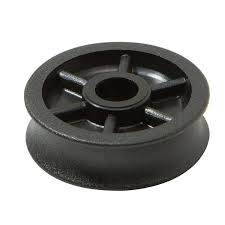
In which industries and applications are plastic pulleys commonly used?
Plastic pulleys find widespread use in various industries and applications due to their unique characteristics and advantages. Here’s a detailed explanation of the industries and applications where plastic pulleys are commonly used:
1. Automotive Industry:
Plastic pulleys are extensively used in the automotive industry. They can be found in engine systems, timing belt systems, accessory drives, power steering systems, and HVAC (Heating, Ventilation, and Air Conditioning) systems. Plastic pulleys offer lightweight solutions, noise reduction, and resistance to corrosion and chemicals, making them suitable for automotive applications.
2. Consumer Electronics:
Plastic pulleys play a crucial role in various consumer electronic devices. They are used in printers, scanners, photocopiers, DVD players, and other office equipment. Plastic pulleys provide noise reduction, low friction, and design flexibility, which are desirable features in consumer electronics where quiet operation and precise movement are important.
3. Medical Equipment:
Plastic pulleys are commonly employed in medical equipment and devices. They are used in diagnostic instruments, laboratory equipment, surgical tools, and patient handling systems. Plastic pulleys offer lightweight construction, corrosion resistance, and design flexibility, making them suitable for medical applications where cleanliness, precision, and ease of use are critical.
4. Packaging and Material Handling:
Plastic pulleys find extensive use in packaging and material handling applications. They are utilized in conveyor systems, sorting machines, printing and labeling equipment, and packaging machinery. Plastic pulleys provide low friction, noise reduction, and resistance to corrosion and wear, making them well-suited for efficient and reliable material handling and packaging processes.
5. Recreational Equipment:
Plastic pulleys are commonly found in recreational equipment and devices. They are used in fitness machines, bicycles, kayaks, sailboats, and other sports and leisure equipment. Plastic pulleys offer lightweight construction, low friction, and resistance to corrosion, making them suitable for recreational applications where performance, durability, and ease of use are important.
6. HVAC Systems:
Plastic pulleys are utilized in heating, ventilation, and air conditioning (HVAC) systems. They are used in fan assemblies, blower motors, and air handling units. Plastic pulleys provide noise reduction, low friction, and resistance to corrosion and moisture, making them suitable for HVAC applications where quiet operation, energy efficiency, and durability are desired.
7. Industrial Machinery:
Plastic pulleys are commonly employed in various industrial machinery and equipment. They are used in conveyors, packaging machines, textile machinery, printing presses, and automation systems. Plastic pulleys offer low friction, design flexibility, and resistance to corrosion and chemicals, making them suitable for industrial applications where reliable operation, efficiency, and durability are essential.
8. Agricultural Equipment:
Plastic pulleys find applications in agricultural machinery and equipment. They are used in crop harvesting machines, irrigation systems, grain handling equipment, and livestock feeding systems. Plastic pulleys offer lightweight construction, low friction, and resistance to corrosion and chemicals, making them suitable for agricultural applications where efficiency, reliability, and resistance to harsh environments are required.
In summary, plastic pulleys are commonly used in industries and applications such as automotive, consumer electronics, medical equipment, packaging and material handling, recreational equipment, HVAC systems, industrial machinery, and agricultural equipment. Their unique features and advantages make them versatile components in various sectors, providing lightweight, corrosion-resistant, low-friction, and noise-reducing solutions.


editor by CX
2024-05-15
